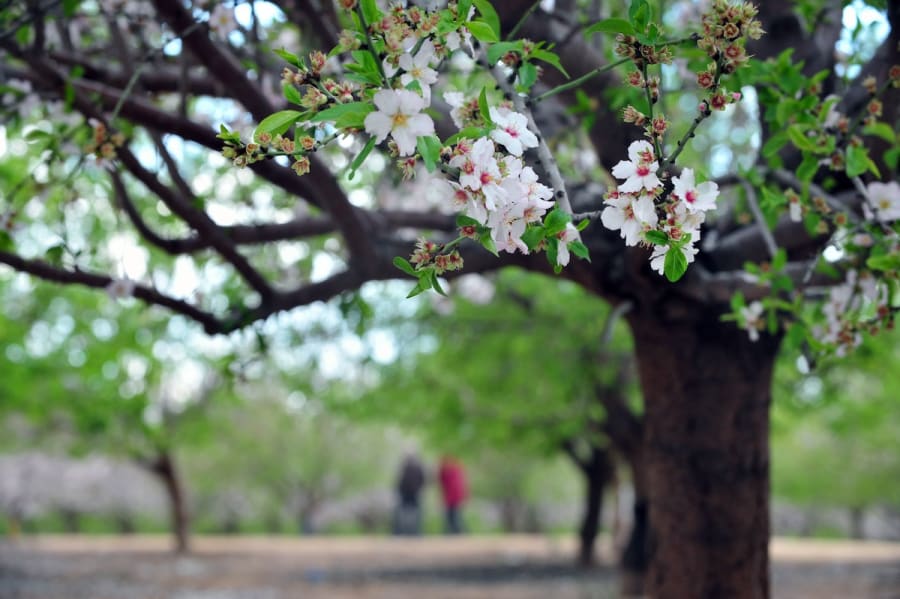Tu B’Shvat: A time to celebrate the Tree of Life

Tu B’Shvat, the Jewish new year for trees, while not a biblically mandated holiday, is filled with opportunities to connect to the richness of our faith and God’s life-giving word. Underneath the surface, it also holds a picture of the spiritual harvest to come for Israel and the Jewish people.
In Israel and the Diaspora, Tu B’Shvat, which falls in late January or early February on the Gregorian calendar, is celebrated as an agricultural holiday and centers around the planting of trees. The holiday was first referenced in the Mishna but has its roots in the bible. In ancient times, Tu B’Shvat helped farmers mark the age of newly planted trees to determine when their fruit was ripe when it would be tithed, and when it could be eaten according to God’s instructions in Leviticus 19:23-25.
Trees are a central part of the Jewish faith, beginning in the Garden of Eden with the Tree of Life and continuing throughout both the Old and the New Testament. The Bible itself is referred to as a “Tree of Life” in the book of Proverbs. The Etz Chaim (literally Tree of Life), a beautiful Hebrew prayer sung in Ashkenazic congregations on Shabbat, is taken directly from Proverbs 3:17,18 and Lamentations 5:21.
Besides mankind, there are more references to trees in the bible than any other living thing. In the Torah, there are instructions about caring for trees in a time of war, and almost every major bible story or event includes trees. Abraham was visited by three angels while sitting under an oak tree. Deborah judged Israel under a palm tree. By the rivers of Babylon, the Israelites hung their harps on willow trees when their captors demanded a song.
In the New Testament, Jesus saw Nathaniel sitting under a fig tree before they met. When speaking about the latter days, Jesus also referred to Israel as the fig tree. Paul referred to Israel as an olive tree in the book of Romans when he wrote about how Gentiles, through faith in Messiah, can enjoy all the same blessings and privileges the nation of Israel does.
In the Middle Ages when Jewish mystics began returning to the land of Israel, Tu B’Shvat was a time to express appreciation to God for the land and its sustenance. It became customary to hold a Seder on Tu B’Shvat with foods from the seven species native to Israel, including dates, figs, pomegranates, olives, grapes, wheat and barley.
The holiday was revived again in the early 20th century when Jewish zionists and pioneers began planting trees in Israel just before the rebirth of the nation. Since then, Jewish communities in the diaspora have held special Seders every year to connect with the land of Israel.
While I was growing up, every year at Tu B’Shvat, in the middle of the dark, dreary winter, when all signs of life were dormant, my Israeli Hebrew teacher would bring a delicious variety of fruits and nuts from Israel for our class to enjoy. We would offer up the blessings over the grape juice and fruit of the trees, thanking God for the first taste of the land before there were ever any real signs of spring. She would show us pictures of the Kibbutzniks working on the farms where citrus fruits were grown, and we would place our shekels (coins) in the blue and white-colored metal tins for The Jewish National Fund to plant trees in Israel. Then, we would plant our own “trees” in small containers using parsley seeds. After several weeks, when spring did finally arrive, we took our parsley plants home to use in our Passover Seder. Tu B’Shvat was always a wonderful reminder that even in the darkest times, there is hope of new life and new beginnings just around the corner.
But does Tu B’Shvat, a holiday centered around trees have anything to teach us about our faith in God and does it have anything to do with what’s going on in Israel right now? The answer is yes! And yes!
The story of redemption in the bible begins and ends with the Tree of Life. In Genesis, when God placed the Tree of Life in the middle of the garden along with the Tree of the Knowledge of Good and Evil, he showed the ultimate act of love after breathing life into Adam. He gave him a choice.
We know what happened next. Mankind didn’t make the right choice, and things took a turn for the worse. Death entered the picture and people have been trying to find a way around it ever since. But God had a plan for human beings to once again eat from the Tree of Life.
He chose Abraham, Isaac and Jacob and their descendants to bring his plan to pass. Ultimately, he himself had to provide the way back to the Tree of Life through Jesus, who took our place and suffered the ultimate curse-death on a tree just outside of Jerusalem.
Now, anyone (Jew or Gentile) who chooses to follow him passes from death to life and is promised to once again eat from the Tree of Life, just as God designed it in the garden. “To him who overcomes, I will give the right to eat from the Tree of Life, which is in the paradise of God.” (Revelation 2:7). Human beings will draw their strength and vitality from this tree once again in Paradise.
But how does that all connect to the people of Israel today?
Since the prophetic rebirth of Israel in 1948, we’ve been living in a time the scriptures describe as the “blossoming of the fig tree.” A time when we’re seeing many of God’s promises for Israel and the Jewish people come to pass. A time when the Jewish people can experience fresh waves of repentance, renewal and revival.
God’s plan of restoration for the nation of Israel is both spiritual and physical. Just like a tree that has been well taken care of throughout the years, the people of Israel have survived generations of persecution and exile because of God’s goodness to preserve them.
In the Old Testament, the fruit of the fig tree symbolized the spiritual state of the people of Israel. Speaking about his return, Jesus states in Matthew 24:32 “Now learn this parable from the fig tree: When its branch has already become tender and puts forth its leaves, you know that summer is near. So, you also, when you see all these things, know that it is near-at the doors!” (Matthew 24:32,33) “Look at the fig tree, and all the trees. When they are already budding you see and know for yourselves that summer is now near. So, you also, when you see these things happening, know that the kingdom is near.” (Lk 21:29-31)
Because Israel’s spiritual state in the Old Testament is symbolized by the fig tree, it stands to reason that when Jesus speaks of the tender branch of the fig tree in the New Testament, he is speaking of Israel’s spiritual state in these last days.
In the wake of October 7th and rising global antisemitism, Jewish people everywhere are searching deeply for answers and for a true friend while they are surrounded by enemies. Their hearts have become tender just like the fig tree Jesus spoke about.
Today, Israel is the blossoming fig tree prophesied about in scripture. The Jewish people have come back to their land, and many are coming to know their Messiah. The land itself is full of well-cultivated, mature fig trees- a beautiful picture and Messianic sign of the continuing restoration to come.”
We know that just as God has restored his people physically to the land, he will also restore them spiritually. Then, they will bear fruit that brings “life from the dead” as Romans 11:15 says, “For if their casting Yeshua aside means reconciliation for the world, what will their acceptance mean but life from the dead!”
Yeshua said, “I am the true vine, and my Father is the gardener. He cuts off every branch in me that bears no fruit, while every branch that does bear fruit he prunes so that it will be even more fruitful.”
As the Jewish people celebrate Tu B’Shvat this year, let’s pray for them to be connected to the true vine that brings forth life-giving fruit!
-(1).jpg)
Avigayil Rivkah is a writer and speaker on the Jewish roots of the Christian faith, Jewish culture and Israel news. She is a Jewish believer in Jesus and writes at ajoyfuljewishjourney.com














